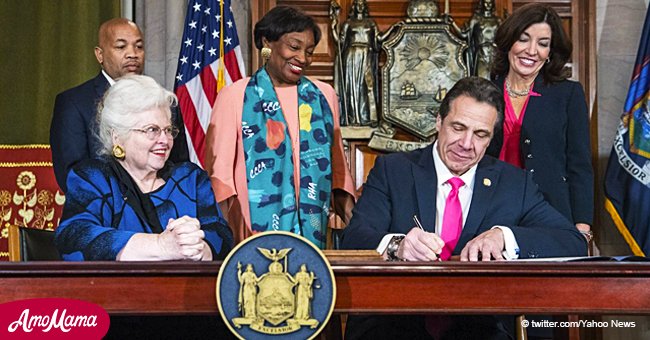
Gov. Andrew Cuomo signs bill legalizing abortions after 24 weeks in specific cases
Gov. Andrew Cuomo updates women's reproductive rights on the 46th anniversary of the Roe v. Wade ruling.
The New York State Senate witnessed a historic moment on January 22, 2019, when Gov. Andrew Cuomo signed an act expanding women's reproductive health rights, and updating the State's regulations on abortion.
Next to Cuomo was seated Sarah Weddington, the Texas attorney who represented "Jane Roe" in a constitutional case in which she challenged the Texas law prohibiting abortion.
"We shouldn't be here in the first place. We should not have a federal government that is trying to roll back women's rights ... This administration (of President Donald Trump) defies American evolution."
Gov. Andrew Cuomo
EXPANDING REPRODUCTIVE HEALTH RIGHTS FOR WOMEN
Cuomo ratified the Comprehensive Contraception Coverage Act passed by the New York State Senate in order to guarantee the rights of women, which he feels are threatened by the Trump administration.
As well as regulating abortion, the act obliges all New York health insurers to cover contraception and prohibits employers from discriminating against an employee reproductive health decision.
Previously, New York State law only allowed abortions after 24 weeks if the mother's life was in danger.
DECRIMINALISING ABORTION
The Comprehensive Contraception Coverage Act removes abortion from the state's criminal code and defines it as being under the aegis of public health law. Abortion was criminalized in New York in 1829 and had been in the statutes ever since.
PERMITTING HEALTH CARE PROVIDERS TO PERFORM ABORTIONS
The new Act also allows health care providers other than licensed physicians to perform abortions. Up until now, it was illegal for any but certified physicians to do so.
LEGALISING ABORTION BEYOND 24 WEEKS
The Comprehensive Contraception Coverage Act also legalizes abortions after 24 weeks in specific cases where it would protect a woman's health or where a fetus is not viable.
Previously, New York State law only allowed abortions after 24 weeks if the mother's life was in danger.
The New York Senate's Act is a response to what is perceived as a very real threat of seeing Roe V. Wade overthrown since the Supreme Court ruled this week to upholds a ban on transgender U.S. military personnel.
THE LANDMARK CASE OF ROE V. WADE
The woman sitting next to Gov. Andrew Cuomo, Sarah Weddington, was present at another landmark moment in American legal history.
In 1970, Weddington and her fellow attorney Linda Coffee represented Norma McCorvey who had been barred from having an abortion in Texas.
McCorvey referred to in the brief as Jane Roe, would end up giving birth before the case was decided, but her struggle would change the lives of women throughout the U.S.
Waddington and Coffee took their case to the Supreme court, and on January 22, 1973, a 7-to-2 majority vote ruled in favor of Roe, declaring that access to abortion was a fundamental right under the United States Constitution.
In a related story, the Ohio Senate passed the anti-abortion 'Heartbeat Bill' prohibiting abortion from the moment when a fetal heartbeat is detected.
